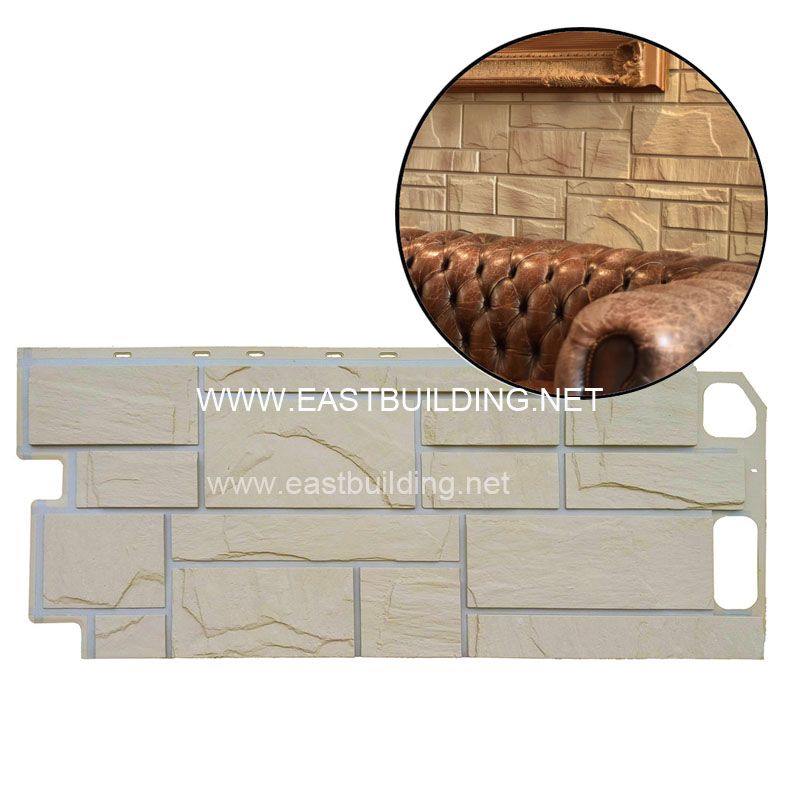+86 137 5078 4689 info@eastbuilding.net 

If you like the appearance of natural stone however not the cost. It's economical and enhances the inside and exterior of your home.

pvc faux stone siding
What Is Stone Veneer?
Stone veneer is an economical, resilient addition that resembles natural stone in a thinner, lighter-weight product yet it's much easier to handle and also set up than all-natural stone. It's available in specific items so you can create your very own diverse patterns for quicker installation. Stone veneer is easy to preserve as well as comes in various shapes, dimensions as well as shades to complement a variety of style systems.
Manufactured stone veneer, often called building stone or actors stone is a cast replica of all-natural stone made from concrete. It has some advantages over genuine stone, including being less costly, light-weight, easier to reduce and it comes in a range of shades.
Fake stone veneer is available in panels, is made from high-density polyurethane, and is usually no thicker than 3/4 inch.
Exterior And Interior Use
Many stone veneers are ideal for exterior and also indoor use. They add structure to an environment as well as personality. There are lots of application choices, from installing a lath, affixing furring strips, or applying building paper. Be sure to comply with the producer's instructions for your detailed task needs.
Never use a cable bristle brush, whether using on an interior or exterior surface area, considering that it can mar and also damage the stone veneer.
Stone veneer functions terrific on accent walls, around entrances as well as arches, as a rustic kitchen backsplash, like a fireplace surround, and a lot more. It can be installed on various substrates, consisting of drywall, plywood, concrete board, concrete, or masonry. For simple cleansing, wipe down with a mild soap or detergent and wash with clean water.
When utilizing as a fireplace surround, use stone veneer that's fire rated.
Stone veneer complements your home's house siding, columns, mailbox surrounds, decking, outside kitchens, smoke shafts, and more.
Prior to setting up veneer on an outside wall or surface areas besides concrete, apply a weather-resistant barrier, a steel lath, and a scratch layer of mortar. The harsh structure of the scratch coat will certainly help make certain a good bond for the stone veneer.
When setting up building information, such as door trim, home window sills, or ledges, guarantee that correct blinking has been mounted prior to using mortar.
Outside stone veneer is also simple to clean and generally requires just a wash-down with a tube or a scrub with a soft-bristle brush.
Whether mounting on outside or indoor concrete, guarantee that the surface area is tidy and also complimentary of dust, dust, oil as well as paint. Before you begin mounting, ensure you remain in compliance with neighborhood laws or developing codes that might affect your setup.
Mortar or Mortarless Stone Veneer
The type of stone veneer you use will certainly establish the installment process. When making use of a clipless individual stone veneer, apply mortar to the rear of each stone before affixing to a surface area. With a common installation, room stones apart and also apply cement between the joints.
Mortarless stone veneer doesn't need mortar or grouting for setup. Instead, they come as private stones or panels, and also they affix to the surface area with either built-in clips or a built-in support plate using nails or screws. The stones are dry-stacked tight and flush, one in addition to the other, without using mortar as a binder in between the stones.
Examine the maker's directions for advised mortar drying time on all installments.
Reducing Stone Veneer
Stone veneer can be cut in a variety of means making use of hand or power tools.
A damp floor tile saw reduces the quantity of dust kicked up and also makes a tidy cut, however, you can additionally utilize a circular saw with a completing blade. An angle mill with a diamond or masonry blade is an additional option that uses an accuracy cut. Marking, scoring as well as striking along the groove with a hammer, and also cold sculpt are various other ways to reduce.
Caution
When cutting stone veneers, constantly wear safety equipment, such as shatterproof glass as well as a safety and security mask.
Mortar
Mortar types differ by stamina, versatility, and also just how well they bond, altering mortars advised for various applications. There are two sorts of mortar that are generally used for stone veneer installment.
Kinds S and also N is the most common mortars utilized. They're thought-about basic purpose for use in exterior and interior installations. Type N works well for outside bearing walls and frameworks. Kind S is more powerful than Type N and functions well for below-grade setups, preserving walls as well as various other installations that enter into call with the ground.
Starter Strip: Strip connected at the base of a structure that supplies a channel to secure in the very first course panels; additionally establishes the tone for a degree installment and also helps with drainage.
Trowel: Apartment, a handheld tool used to spread out scrape layer and mortar
Jointer: Thin device made use of to smooth, recess as well as shape joint grout
Cement Bag: Cone-shaped bag with grout used to fill out between stone joints
Rake: Made use of to produce the vertical scrape layer lines
Level: Utilized to identify the horizontal aircraft